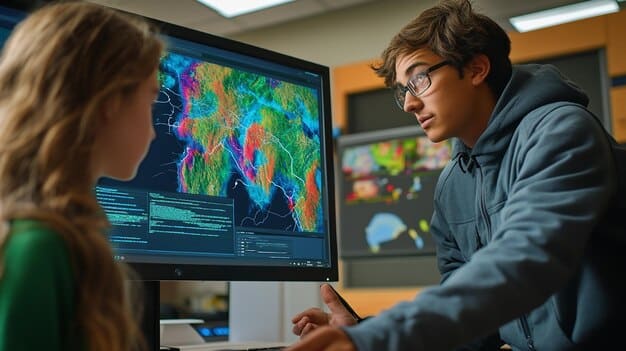Gen Z’s Tech Fight Against Climate Change in the US: Innovations Unveiled

Gen Z in the US is actively leveraging advanced technology, from AI-driven data analysis to sustainable product development and digital advocacy, to spearhead innovative solutions and combat climate change, showcasing a unique blend of technological fluency and environmental consciousness.
In an era defined by rapid technological advancement and escalating environmental concerns, a new generation is stepping up with innovative solutions. How Gen Z is Using Technology to Combat Climate Change in the US: A Look at the Latest Innovations unveils a proactive movement, demonstrating how digital natives are leveraging their inherent tech-savviness to drive meaningful change. This article explores the groundbreaking ways this generation is turning digital tools into powerful weapons against global warming, offering a fresh perspective on environmental activism.
Understanding Gen Z’s Digital Native Advantage in Climate Action
Gen Z, broadly comprising individuals born between the mid-1990s and early 2010s, are the first true digital natives. They grew up with the internet, social media, and mobile technology as integral parts of their lives. This innate comfort with technology, coupled with a deep-seated concern for social and environmental issues, provides them with a distinct advantage in tackling complex challenges like climate change.
Their fluency in digital communication allows for rapid dissemination of information and mobilization of campaigns, far exceeding the reach of previous generations. This generation isn’t just aware of climate change; they are acutely aware of its direct impact on their future and are intrinsically motivated to find scalable solutions.
The Shift to Digital Activism
Traditional forms of activism, while still valid, are increasingly complemented by digital strategies. Gen Z has mastered the art of online mobilization, transforming social media platforms into powerful tools for advocacy and awareness.
- Hashtag Campaigns: They initiate and amplify hashtags that bring critical climate issues into mainstream conversations, garnering millions of impressions and fostering global solidarity.
- Viral Content Creation: Short-form videos, infographics, and memes are used to simplify complex scientific information, making it accessible and shareable to a wider audience, breaking down barriers to understanding.
- Online Petitions and Fundraising: Digital petitions quickly gather signatories for policy changes, while crowdfunding platforms enable direct financial support for green initiatives and climate organizations.
This digital-first approach ensures that climate messages are not only heard but also acted upon by a diverse demographic, spanning geographic and socio-economic boundaries. Their constant connectivity means that a message can go viral in hours, reaching decision-makers and inspiring collective action on an unprecedented scale.
Beyond simple awareness, Gen Z utilizes these platforms for real-time monitoring of environmental issues and holding corporations and governments accountable. They are adept at filtering through misinformation, cross-referencing sources, and leveraging data to present compelling arguments for climate action, thereby embodying a new form of digital stewardship for the planet.
Leveraging AI and Data Analytics for Environmental Insight

Artificial Intelligence (AI) and sophisticated data analytics are no longer just tools for tech giants; they are becoming crucial instruments in the hands of Gen Z climate innovators. This generation recognizes the power of big data in understanding environmental patterns, predicting future scenarios, and developing targeted interventions. They are not merely users of these technologies but often their developers and pioneers.
From tracking deforestation rates with satellite imagery processed by AI to optimizing renewable energy grids, Gen Z is integrating these advanced capabilities into grassroots initiatives and startups.
AI-Powered Monitoring and Prediction
AI’s capacity to process vast datasets at speeds impossible for humans makes it invaluable for environmental monitoring. Gen Z is at the forefront of applying these techniques.
- Real-time Pollution Tracking: Developing apps and sensors that use AI to monitor air and water quality, providing communities with immediate, localized data to demand action.
- Climate Modeling Enhancements: Utilizing machine learning algorithms to refine climate models, offering more accurate predictions of extreme weather events and long-term climate shifts, informing adaptive strategies.
- Biodiversity Conservation: Employing AI to analyze patterns in wildlife populations, detect poaching activities, and monitor ecosystem health, thus aiding conservation efforts by providing actionable insights.
This level of data-driven insight empowers quick, informed decisions. Instead of reacting to environmental damage, Gen Z is using AI to anticipate and prevent it, shifting the paradigm of climate action from mitigation to proactive resilience. Their comfort with complex algorithms and programming languages enables them to build these solutions from the ground up, ensuring relevance and accessibility.
Furthermore, data analytics platforms, often integrated with AI, help map carbon footprints of various industries and visualize the impact of policy changes. This allows Gen Z advocates to present evidence-based arguments to policymakers and businesses, fostering a more informed dialogue around sustainable development. They transform raw data into compelling narratives that resonate with diverse stakeholders, from local communities to global corporations.
Sustainable Innovation in Product Development and Circular Economy
Beyond advocacy and data, Gen Z is actively reshaping consumption patterns through sustainable product development and championing the circular economy. They are not content with criticizing existing systems; they are building alternatives that prioritize environmental stewardship from design to disposal. This practical application of technology showcases a significant shift towards tangible, scalable solutions.
Their entrepreneurial spirit, combined with a deep environmental consciousness, drives them to create businesses and projects that are inherently sustainable, addressing issues ranging from waste reduction to resource efficiency and ethical sourcing. They are particularly drawn to innovations that challenge linear economic models.
Tech-Driven Solutions for a Greener Future
Gen Z is exploring diverse technological avenues to foster sustainable practices and develop eco-friendly products.
- Eco-Friendly Materials Science: Pioneering research and development into biodegradable plastics, plant-based textiles, and sustainable construction materials, aiming to reduce reliance on fossil fuels and minimize waste generation.
- Upcycling and Recycling Technologies: Creating platforms and technologies that facilitate the upcycling of waste materials into new products, and improving the efficiency and accessibility of recycling initiatives through smart sorting and processing.
- Sustainable Agriculture and Food Tech: Innovating in areas like vertical farming, lab-grown meat, and intelligent irrigation systems to reduce resource consumption in food production and minimize agricultural impact on ecosystems.
These initiatives not only aim to reduce environmental harm but also often result in more efficient and cost-effective processes, making sustainability a viable and attractive business model. Gen Z entrepreneurs are proving that economic growth doesn’t have to come at the expense of the planet, but can instead be intrinsically linked to ecological responsibility. Their collaborative approach means knowledge and innovations are often open-sourced, accelerating collective progress.
The emphasis on the circular economy also manifests in their promotion of repair culture. They utilize online tutorials, forums, and even develop apps to teach others how to fix broken items, extending product lifespans and reducing waste. This holistic approach, from material innovation to product end-of-life, defines Gen Z’s comprehensive strategy for sustainable living, showing a clear pathway for others to follow.
Educating and Mobilizing Through Digital Platforms
An informed public is a powerful force for change, and Gen Z understands this implicitly. They are masters of digital communication, leveraging various platforms not just for activism, but for widespread environmental education and mobilization. Their approach is often characterized by breaking down complex scientific concepts into digestible, engaging content, making climate science accessible to everyone, regardless of their background.
This generation also excels at building online communities centered around climate action, fostering a sense of collective responsibility and empowering individuals to take meaningful steps. They act as digital educators, translating scientific consensus into actionable advice and fostering optimism in the face of daunting challenges.
Strategies for Digital Engagement and Education
Gen Z’s educational initiatives span a wide range of digital tools and creative approaches, ensuring broad reach and deep engagement.
- Interactive Websites and Apps: Developing educational apps and interactive websites that explain climate science, provide carbon footprint calculators, and suggest sustainable lifestyle changes, often gamifying the learning process.
- Online Workshops and Webinars: Hosting virtual workshops and webinars on topics like sustainable living, renewable energy, and climate policy, reaching a global audience who might not have access to traditional educational resources.
- Influencer Partnerships and Creator Economy: Collaborating with online influencers and leveraging the creator economy to produce compelling educational content, ensuring messages resonate with peers and broader audiences through authentic voices.
By making education engaging and easily shareable, Gen Z bypasses traditional media gatekeepers, disseminating crucial environmental information directly to their peers and beyond. Their ability to connect with audiences on a personal level through digital storytelling fosters a deeper understanding of climate change, inspiring individual action and collective movements. This direct communication transforms passive observers into active participants.
Furthermore, they utilize these platforms to highlight success stories and showcase positive change, counteracting climate despair with examples of innovation and progress. This balanced approach, combining urgency with optimism, is critical for sustained engagement. They are building a digitally interconnected network of climate advocates, demonstrating that knowledge, when shared effectively, can be the most potent tool in the fight against environmental degradation.
Fostering Green Entrepreneurship and Investment
Gen Z is not waiting for established institutions to solve the climate crisis; many are actively building the solutions themselves. This includes a significant push towards green entrepreneurship and influencing investment patterns towards sustainable ventures. Their technological fluency enables them to identify market gaps for eco-friendly products and services, and their values drive them to create businesses that prioritize planetary health alongside profit.
They are increasingly seeking out and supporting businesses with strong Environmental, Social, and Governance (ESG) credentials, and are not afraid to use their collective consumer power to drive corporate accountability. This shift in consumer behavior is forcing industries to adapt and innovate, reflecting Gen Z’s growing economic influence.
Incubating Sustainable Business Models
Gen Z is leveraging technology to create platforms and businesses that support sustainable growth and responsible investment.
- Sustainable Startup Incubators: Launching and participating in incubators focused on nurturing green tech startups, providing mentorship, funding, and networking opportunities for environmentally conscious entrepreneurs.
- Ethical Investment Platforms: Developing fintech solutions that allow peers to easily invest in socially responsible companies and green bonds, democratizing access to ethical financial products.
- E-commerce for Eco-conscious Products: Creating online marketplaces dedicated to selling sustainable and ethical goods, making it easier for consumers to make responsible purchasing decisions and support green businesses.
This entrepreneurial wave is generating new jobs and driving economic growth within the green sector, demonstrating that environmental responsibility can be a powerful engine for innovation and prosperity. Gen Z’s tech-driven approach to business models often incorporates transparency and traceability, allowing consumers to verify the environmental claims of products. They are not just selling products; they are selling a vision of a sustainable future, built on principle and powered by technology.
Their influence extends to venture capital and private equity, where their preference for sustainable investments is pushing firms to re-evaluate their portfolios. This generation understands that financial capital deployed strategically can accelerate the transition to a low-carbon economy. By both starting their own green businesses and directing investment flows, Gen Z is actively shaping a more sustainable economic landscape from the ground up, impacting policy through economic demonstration rather than just direct lobbying.
Addressing Environmental Justice Through Technology
Beyond the broader climate crisis, Gen Z keenly recognizes the disproportionate impact of environmental degradation on marginalized communities—an issue known as environmental justice. They are utilizing technology to amplify the voices of these communities, expose injustices, and develop solutions that address systemic inequalities exacerbated by climate change. Their approach is intersectional, linking environmental action with social equity and human rights, ensuring that climate solutions are fair and inclusive for all.
Through digital mapping, data visualization, and direct communication channels, Gen Z is bringing forgotten environmental battles to the forefront, empowering affected populations, and demanding accountability from polluters and policymakers. It’s a powerful combination of tech advocacy and social responsibility.
Tech Tools for Equity and Awareness
Gen Z employs various technological tools to champion environmental justice, focusing on data, communication, and community empowerment.
- Geographic Information Systems (GIS) Mapping: Using GIS to map pollution sources, health disparities, and climate vulnerabilities in frontline communities, providing visual evidence for legal and advocacy efforts.
- Community Reporting Platforms: Developing apps and online platforms that allow residents to report environmental hazards and injustices in real-time, creating a collective database of violations that can be used to hold corporations and governments accountable.
- Digital Storytelling and Testimony: Creating multimedia content, including documentaries, podcasts, and virtual reality experiences, to share the stories and experiences of communities affected by environmental injustice, fostering empathy and inspiring action.
By leveraging these technologies, Gen Z ensures that environmental justice issues gain visibility and resonate with a wider audience, translating local struggles into national and international movements for change. They facilitate direct communication between affected communities and decision-makers, bypassing traditional power structures and amplifying marginalized voices. Their efforts are leading to policy changes that protect the most vulnerable from environmental harm.
They are also actively working to bridge the digital divide, ensuring that technology is accessible to communities that need it most for environmental monitoring and advocacy. This includes initiatives to provide internet access, training, and devices. Through this multifaceted approach, Gen Z is not just fighting climate change; they are fighting for a more just and equitable world, recognizing that environmental health and social equity are inextricably linked, leveraging technology to build bridges and dismantle barriers.
| Key Area | Brief Description |
|---|---|
| 📊 Data & AI | Gen Z uses AI for climate modeling, pollution tracking, and biodiversity monitoring, turning data into actionable insights. |
| ♻️ Sustainable Innovation | They develop eco-friendly products, circular economy models, and sustainable agriculture tech to reduce waste. |
| 📣 Digital Advocacy | Leveraging social media for widespread awareness campaigns, petitions, and direct engagement with policymakers. |
| 🌎 Environmental Justice | Utilizing tech to highlight disproportionate impacts on marginalized communities and advocate for equitable solutions. |
Frequently Asked Questions
Gen Z employs social media platforms for creating viral content and hashtag campaigns, simplifying complex climate science, and mobilizing online petitions. They also use these platforms for real-time advocacy, raising awareness, and garnering widespread support for various environmental initiatives.
AI is crucial for Gen Z’s climate efforts, enabling real-time pollution tracking, enhancing climate modeling for better predictions, and aiding biodiversity conservation. They use AI to process vast datasets, gain valuable insights, and develop targeted, proactive solutions to environmental challenges, making data actionable.
Gen Z is promoting sustainable product development by researching eco-friendly materials, developing recycling technologies, and innovating in sustainable agriculture. Their focus is on creating products that minimize environmental impact, support the circular economy, and offer viable, greener alternatives to traditional goods and services.
Gen Z strives to make their tech-driven climate solutions widely accessible. They develop user-friendly apps, interactive websites, and open-source projects. However, digital access can still be a barrier in some communities. Efforts are continually being made to bridge this digital divide and ensure inclusivity.
Gen Z addresses environmental justice by using technology to map pollution, create community reporting platforms for hazards, and share stories of affected communities. This amplifies marginalized voices, exposes inequities, and advocates for data-driven, equitable climate solutions that protect vulnerable populations from environmental harm.

Conclusion
As the primary custodians of the future, Gen Z has clearly positioned itself at the forefront of the climate change battle, wielding technology as their most potent weapon. Their innovative application of digital tools, from AI and data analytics to social media activism and green entrepreneurship, marks a pivotal shift in how environmental challenges are addressed. They are not merely inheriting a planet in crisis; they are actively engineering its sustainable future, one technological innovation at a time. Their deep understanding of interconnected systems—social, environmental, and technological—enables them to craft holistic solutions that transcend traditional boundaries. This proactive and integrated approach, combining digital fluency with a powerful sense of purpose, offers a beacon of hope for a world grappling with complex environmental issues. The digital natives are indeed the environmental pioneers of our time, setting new precedents and inspiring global action through their unwavering commitment to a greener, more just world.